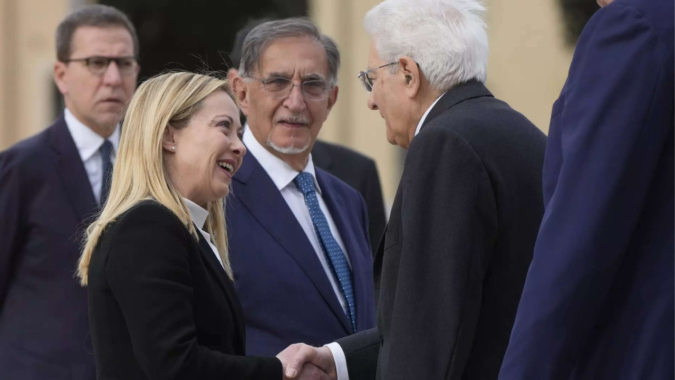ROME: Italian Premier Giorgia Meloni on Tuesday called for unity among political forces in celebrating the anniversary of the liberation from the Nazis and their Fascist allies on April 25, 1945.
Meloni, whose hard-right Brother of Italy party traces its roots to the wreckage of Italian fascism at the end of World War Two, firmly rejected accusations of fascism nostalgia within the party.
In an open letter to Italian daily Il Corriere della Sera, Meloni wrote she hoped that the celebrations could be an occasion of “renewed national concord,” strengthening Italy’s role in the world as “essential stronghold of democracy.”
Allies and aides of the 46-year-old premier have been accused in several occasions of downplaying atrocities carried out by the Nazis and Fascists, or distorting historical facts concerning the partisan movement that fought to liberate the country.
Six months after she took office, Meloni’s presence at the official remembrance event at Rome’s Altar of the Fatherland on Tuesday morning, alongside Italian President Sergio Mattarella, was seen by many observers as a turning point.
Meloni herself used the word “watershed” to remember April 25, 1945 in her letter, defining it a crucial moment in Italian history, as it paved the way to the victory of those “democratic values, that Fascism had crushed and that we find carved into the Italian Republic’s constitution.”
Meloni has repeatedly sought to allay concerns about her party’s neo-fascist roots, insisting that the Italian right had handed fascism over to history and unambiguously condemned the suppression of democracy and anti-Jewish laws.
Some critics, however, have stressed that she has never clearly declared her party’s “anti-fascist” stance since she stepped into power at the helm of the most conservative government since WWII.
“For many years now, as any honest observer would acknowledge, the parties that represent the right in the Italian parliament have declared their incompatibility with any nostalgia for fascism,” Meloni wrote on Tuesday.
Since becoming premier in October, Meloni has also reached out repeatedly to members of Rome’s Jewish community.
But one of the Brothers of Italy’s leaders, Senate President Ignazio La Russa – who proudly displayed Mussolini memorabilia in his home – recently reignited the controversy around the party’s roots, saying that the Italian constitution never openly included the word “anti-fascism.”
As a teenager, Meloni joined the youth branch of Italy’s neo-fascist party, the Italian Social Movement, or MSI, which was part of Italy’s first postwar government in 1946. She then went onto lead the youth movement of MSI’s successor party, the National Alliance.
The Brothers of Italy party succeeded the National Alliance and retains the tricolor flame of the original MSI as its logo.
Meloni, whose hard-right Brother of Italy party traces its roots to the wreckage of Italian fascism at the end of World War Two, firmly rejected accusations of fascism nostalgia within the party.
In an open letter to Italian daily Il Corriere della Sera, Meloni wrote she hoped that the celebrations could be an occasion of “renewed national concord,” strengthening Italy’s role in the world as “essential stronghold of democracy.”
Allies and aides of the 46-year-old premier have been accused in several occasions of downplaying atrocities carried out by the Nazis and Fascists, or distorting historical facts concerning the partisan movement that fought to liberate the country.
Six months after she took office, Meloni’s presence at the official remembrance event at Rome’s Altar of the Fatherland on Tuesday morning, alongside Italian President Sergio Mattarella, was seen by many observers as a turning point.
Meloni herself used the word “watershed” to remember April 25, 1945 in her letter, defining it a crucial moment in Italian history, as it paved the way to the victory of those “democratic values, that Fascism had crushed and that we find carved into the Italian Republic’s constitution.”
Meloni has repeatedly sought to allay concerns about her party’s neo-fascist roots, insisting that the Italian right had handed fascism over to history and unambiguously condemned the suppression of democracy and anti-Jewish laws.
Some critics, however, have stressed that she has never clearly declared her party’s “anti-fascist” stance since she stepped into power at the helm of the most conservative government since WWII.
“For many years now, as any honest observer would acknowledge, the parties that represent the right in the Italian parliament have declared their incompatibility with any nostalgia for fascism,” Meloni wrote on Tuesday.
Since becoming premier in October, Meloni has also reached out repeatedly to members of Rome’s Jewish community.
But one of the Brothers of Italy’s leaders, Senate President Ignazio La Russa – who proudly displayed Mussolini memorabilia in his home – recently reignited the controversy around the party’s roots, saying that the Italian constitution never openly included the word “anti-fascism.”
As a teenager, Meloni joined the youth branch of Italy’s neo-fascist party, the Italian Social Movement, or MSI, which was part of Italy’s first postwar government in 1946. She then went onto lead the youth movement of MSI’s successor party, the National Alliance.
The Brothers of Italy party succeeded the National Alliance and retains the tricolor flame of the original MSI as its logo.
